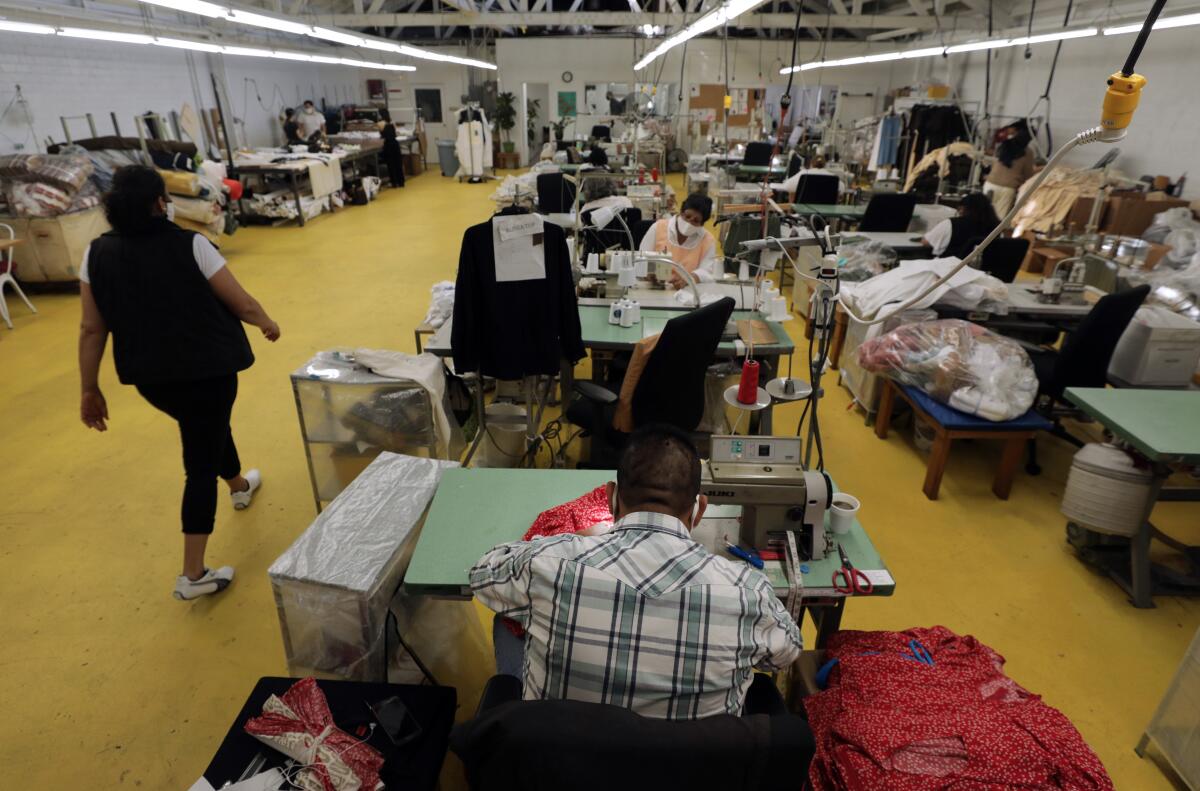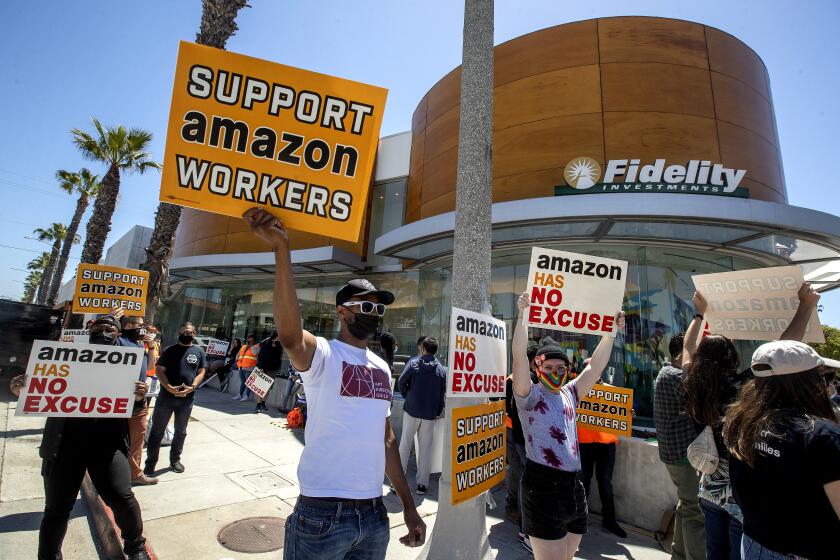Wage theft is a problem for L.A. garment workers. A California bill aims to fix it. Again

The garment industry relies on a complex web of contractors and manufacturers to deliver apparel to fashion brands. It’s a setup that lowers costs, but also one that allows fashion brands to escape scrutiny for instances of wage theft and poor working conditions among their suppliers.
A bill on its final lap through the California Legislature aims to overhaul the industry’s pay model and introduce more accountability into the fashion supply chain.
The proposed legislation has split the industry, with many fashion brands and trade groups saying the bill overreaches in placing blame on them for working conditions and wage theft perpetrated largely by third-party contractors. They warn it will shrink an already diminished Los Angeles industry by encouraging companies to tap out-of-state manufacturers. Garment workers and labor advocates maintain that brands sparked a “race to the bottom” in wages and should be held responsible for what they say are some of the worst labor law violations they’ve seen.
“These are the same working conditions of 100 years ago in New York City today in L.A. We’re not going to allow that to happen. California is a much better state than that,” said state Sen. María Elena Durazo (D-Los Angeles) who wrote the bill, SB 62.
The bill, passed by the Senate, is expected to reach the Assembly floor by next week. The legislation is a reincarnation of a bill that died last year when, amid the pandemic, lawmakers failed to call it for a vote before the midnight deadline.
Marissa Nuncio, the director of downtown L.A.’s Garment Worker Center, which is co-sponsoring SB 62, said she’s confident about getting the bill through the Assembly, but recognizes the significant opposition. “Every time you’re trying to tilt the balance of power in an industry, it’s going to be controversial.... But it’s untenable to continue this way.”
If approved, SB 62 would require apparel factories to pay garment workers an hourly wage, abolishing the practice of paying per piece produced, with the exception of using output as an incentive bonus. It also would expand fashion brands’ and retailers’ liability for wage theft, even if workers were shortchanged by third-party contractors.
AB 701, headed to a Senate vote this week, is the first legislation in the U.S. that would regulate warehouse performance metrics.
Typically, workers who allege unpaid wages or violations of minimum wage laws bear the burden of demonstrating the validity of the claims. SB 62 would instead direct the labor commissioner to shift more of that burden of proof to brand guarantors, contractors and garment manufacturers to show they did not violate wage laws.
“We work 60 to 70 hours a week for a salary of $250 to $300. It’s not enough to take care of our families,” said former garment worker Santa Puac at an August event organized by SB 62 advocates to write letters in support to Gov. Gavin Newsom and raise awareness about the legislation.
The event was hosted by Christy Dawn, a vintage-style women’s clothing designer with a storefront on Abbot Kinney Boulevard in Venice, and one of about 160 fashion brands that have endorsed the bill. These companies tend to be smaller brands that carry higher price tags, including labels touting sustainability and local manufacturing.
Last year, Fashion Nova, the popular fast-fashion retailer, joined the effort to support the first version of the bill after coming under fire for wage theft in its supply chain. The company has not indicated it supports SB 62 this year, said Kate Alexandria, an advocate with the Garment Worker Center, which provides resources and services to apparel workers in downtown L.A. Fashion Nova did not respond to a request for comment.
“The bottom-feeding, ultra-fast-fashion brands purport that this bill will hurt the industry. For any fashion brand who says should this bill pass we will leave California, it means that they are unwilling to honor the law and engage in wage theft,” said Ayesha Barenblat, founder and chief executive of Remake, a nonprofit supporting SB 62 that aims to improve working conditions and environmental sustainability practices in fashion.
Apparel industry trade groups have come out strongly against SB 62. They argue the bill goes too far in boosting liability for brands and unfairly places the burden of proof in wage theft claims on labels that might have no knowledge of abuses happening in their supply chains. The result, they say, will be a move by fashion labels to contract with manufacturers outside California, shrinking demand for a garment manufacturing workforce in the state.
“The bill, as currently drafted, does not recognize that brands or buyers may have little to no control over how a particular garment factory employer manages their payroll or enterprise finances,” Steve Lamar, president and CEO of the American Apparel and Footwear Assn., wrote in a letter to Newsom.
The California Chamber of Commerce put the bill on its “job killer” list and wrote in a statement that it eliminates the piece rate as a method of payment “even though it can benefit the employee.”
A 2016 study by the UCLA Labor Center found that Southern California garment workers earned an average of $5.15 an hour, less than half the minimum wage at the time. The study also found that unsafe conditions were widespread. The Senate Judiciary Committee cited the study in its analysis of the bill. It also cited a federal Department of Labor survey that revealed that 85% of garment workers earn less than minimum wage.
Before dawn six days a week, Norma Ulloa left the two-bedroom apartment she shared with four family members and boarded a bus that took her to a stifling factory on the outskirts of downtown Los Angeles.
Ashley Hoffman, a policy advocate at the California Chamber of Commerce, said industry stakeholders could live with a ban on the piece-rate system: “We’re OK with it.” It’s the provision expanding wage theft liability for fashion brands that companies are concerned about, she said.
SB 62 would update labor reforms passed in 1999 that made brands liable for wage violations by the contractors that produce their garments. The law was prompted by a discovery four years prior that 72 undocumented Thai immigrants were essentially enslaved in an El Monte sweatshop.
The 1999 law created “proportional liability,” meaning brands are on the hook to pay only the portion of lost wages corresponding to the garments the worker produced for them.
SB 62 proposes that fashion brands be held legally responsible for the full amount of harm done to a worker, even if other brands were also responsible in some part for that harm — the idea is that it would make them accountable to any work performed within their supply chain. Once the worker is wholly compensated, fashion labels could negotiate among themselves to ensure each entity pays its corresponding share. To protect their financial interests, brands might begin to require that contracted producers carry bonds or insurance to cover any wage claims.
Hoffman added that some contractors skirt existing minimum wage laws by refusing to register and obtain a local license, and that labor advocates should focus on enforcing those violations rather than penalize fashion brands that don’t have control over the contractors they hire to manufacture their products.
Labor advocates said the increasingly layered use of contractors over the last two decades has made it harder to enforce the law, and that SB 62 provides crucial updates to language that more clearly defines which entities are considered liable and bolsters authorities’ ability to conduct inspections.
Subcontractors are tricky to hold accountable, said Victor Narro, a UCLA professor studying labor and project director of the campus’ Labor Center, who helped draft the original 1999 legislation. These operators are very “fly by night,” he said; they may hire workers, engage in wage theft and then disappear — declaring bankruptcy or otherwise skirting responsibility.
Fashion brands set the chain of events in motion and shouldn’t shrug off their responsibility, Narro said, as they profit from paltry wages and knowingly employ contractors perpetrating wage violations.
“Their arguments have always been, ‘We cannot be responsible for a few bad apples,’” he said. “If it’s just a few bad apples, then what are they worried about?”
The profusion of warnings stemming from California’s landmark consumer safety law has left shoppers overwarned, underinformed and potentially unprotected, a Times investigation has found.
The pandemic made the bill’s passage more urgent for Francisco Tzul, a 58-year-old garment worker. He said he has worked in numerous sweatshops in old buildings infested with insects and rats, with workers crammed into dark, poorly ventilated rooms that had only one small window.
“In the summer it’s like hell, and not to mention the steam from the iron is suffocating. It’s hard to describe how it is,” Tzul said.
He said his panic mounted last year during the pandemic as he was forced to cram into small elevators with co-workers to get to the factory floor and as the company he worked for failed to implement safety measures to limit the spread of the coronavirus.
Last summer, Tzul caught COVID-19 and spent two frightening weeks hospitalized. Authorities temporarily shut down the Los Angeles Apparel factory in South Los Angeles where he worked after an investigation found more than 300 coronavirus infections and four deaths among Tzul’s co-workers. (The company did not immediately respond to a request for comment but has previously stated that it works in a timely fashion to notify potentially exposed employees.)
Tzul recently secured a job with higher wages in a small clothing factory where he’s eligible for overtime. He said he’s one of the lucky ones.
Nuncio of the Garment Worker Center said that despite the bill languishing last year, the effort has gained even more support, particularly during the pandemic.
“It really made workers all the more upset and angry and ready, motivated to fight,” Nuncio said. “They were saying: ‘We’re making masks, we’re making medical apparel for 2 cents apiece and risking COVID, and no one cares. We’re called essential workers but don’t have essential protections.’”
More to Read
Inside the business of entertainment
The Wide Shot brings you news, analysis and insights on everything from streaming wars to production — and what it all means for the future.
You may occasionally receive promotional content from the Los Angeles Times.














